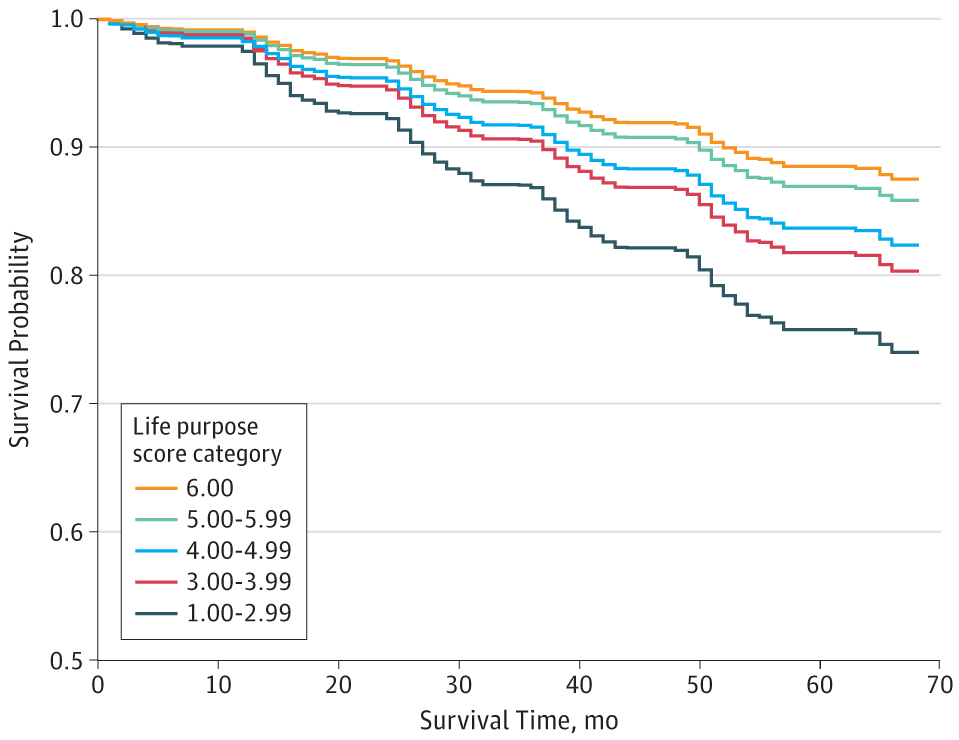The Warrior’s Object of Devotion | Purpose in Life (Part 2)
Why should you be devoted to some greater purpose?
In the last post we discussed how warriors are devoted to their lord, and that this concept of service to something greater than ourselves can be applied to our lives when we have an ultimate purpose. I presented three different perspectives on life purpose:
Nihilism: there is no inherent purpose to life and determining man’s own meaning is futile
Existentialism: there is no inherent purpose to life so man should seek to create his own meaning
Teleology: there is an inherent purpose to life that man should seek to learn and follow
In this post, we’ll consider the implications of living a life with or without purpose; nihilism versus both existentialism and teleology.
Why should we live a purposeful life?
While this only scratches the surface of these centuries-old questions, I’ve found that there is quite a bit of evidence that nihilism is an inferior worldview to one with purpose. This evidence is compelling and worth contemplating as you consider your own worldview.

Common Belief
Philosophers
The first piece of evidence against nihilism is that there are no prominent philosophers who would claim to be pure nihilists and refute that life has some kind of meaning. Freiderich Nietzsche is often attributed to the philosophy. However, he was actually a critic of a truly purposeless existence, going as far to believe that “[nihilism’s] corrosive effects would eventually destroy all moral, religious, and metaphysical convictions and precipitate the greatest crisis in human history.” Albert Camus was close to nihilism, but ultimately created his own worldview of absurdism: find joy despite the absurdity of life1.
Humanity at Large
Second point against nihilism: most people believe that there is purpose to life. Two recent studies2 found that 81-83% of US adults believe that there is a greater purpose and meaning to it all. While popular opinion is by no means the only test of truth, we shouldn’t ignore the millions (if not billions) of people and the countless philosophers who share this belief.
Increasing Pessimism
Although the “purposeful life” crowd represents a vast majority, society has recently become less confident about our place in the universe. Scott McConnell, director of Lifeway Research observes that, “few Americans are ready to deny there is an ultimate purpose and plan for every person’s life. But more are stepping back from this driving their own pursuits. Life has become a more pessimistic pursuit with fewer going all out for something better.” A recent study conducted in 2023 by Harvard found that an astonishing “3 in 5 young adults (58%) reported that they lacked ‘meaning or purpose’ in their lives in the previous month.” One respondent captures the feeling of many in Gen Z, reporting: “I have no purpose or meaning in life. I just go to work, do my mundane job, go home, prepare for the next day, scroll on my phone, and repeat.”

The Fruit of a Purposeful Life
My third collection of evidence for living purposeful lives is the long list of profound benefits that a purpose driven life has on people, backed up by tons of research3:
People with purpose are generally more satisfied with their lives through adolescence, emerging adulthood and adulthood4.
People with purpose have better mental health with less depressive symptoms5 and are less likely to report depression and anxiety6. Harvard found that half of young adults said their mental health was negatively influenced by “not knowing what to do with my life.”7. Dr. Anthony Burrow of Cornell also observes that “a sense of purpose… gives us a sense of psychological homeostasis. We are confronted with the ups and downs of life, but purpose is an active ingredient that helps us stay stable.”8
People with purpose have better physical health and fitness, measured in many different ways ranging from greater heart health to less chronic illness to reduced risk of developing Alzheimer’s to walking faster to more favorable biomarkers9.
People with purpose maintain healthier lifestyles including increased physical activity, fruit and vegetable consumption, and sleep quality10.
People with purpose live longer11. A 2019 study of people older than 50 found that a higher life purpose score resulted in decreased mortality; the graph illustrating longevity (survival probability over time) for different life purpose scores is quite impressive:
People with purpose are less lonely and have stronger personal relationships, spending more time in social activities and less time alone or watching TV12.

People with purpose participate more in broader social engagement like involvement in civic society, cultural activity, and volunteering13.
People with purpose have greater prosperity using wealth and income as proxies14.
Based on these observations, it seems that the nihilist worldview is unattractive at best and untenable at worst. The purposeful life - waking up every morning with a reason to get out of bed - seems to be much more appealing and fulfilling (and frankly more fun).
What is the ultimate purpose of life?
So, at this point, let’s say you agree with existentialism or teleology. Whether purpose is self-defined or defined by a higher power, we’ll assume that life has purpose.
Before we ask what that purpose is, I’d like to clarify the question: What is the “ultimate” purpose of life? I believe this clarification is really important.
Why an “ultimate” purpose?
As we considered in the last post: we all serve somebody, worship something, or bet our lives on something. While we may have different goals, priorities, and values in life (what I would call a “sub-purpose”), they all still fall within the context of one single broader purpose like an umbrella. I have tried to capture my rationale for this argument in a couple points:
1. There is a deeper “why” behind our “sub-purposes”
Let’s say four people want to attend a prestigious university. While they might share the same “sub-purpose”, their deeper motivations may vary drastically. One may be spurred on by the desire to please their parents, one by the drive for recognition from peers, one to earn tons of money after school, one for the thirst for top-tier knowledge and education.

The same could be applied to something like working out: Are you trying to gain a physique that will make you more attractive to potential romantic partners? Are you training to win a competition? Are you using it as a way to release stress? Are you intending to improve your general health and longevity?
In both scenarios, there may be different underlying assumptions, worldviews, or ultimate purposes that manifest as a similar “sub-purpose.” You can often discern the ultimate purpose for something by asking 5 “Why” questions to determine the root reason for such beliefs, peeling back the layers to reach the core.
2. We must prioritize our conflicting “sub-purposes”
We could easily have many different reasons for why we might act in a particular way, or several motivations that result in “sub-purposes”. But what happens when those reasons and motivations conflict?
What if going to that prestigious university means sacrificing important relationships? What if it means having to take out a seriously burdensome student loan?
What if achieving fitness and strength through working out means you would have to give up the pleasure of eating and drinking whatever you want? What if the only time in your schedule you have to exercise conflicts with volunteering for a cause you’re passionate about?


The rationale you use to justify your decisions in these moments of conflict is an indication of what is most important to you. This often unspoken hierarchy and prioritization of your purposes reflect your worldview and ultimate purpose.
List of potential purposes
To bring it full circle, this all aligns with the concept of a warrior-like devotion. Warriors would sacrifice everything for their lord, and their “sub-purposes” would all ideally align with that life of service. Who or what do you ultimately serve, worship, or bet your life on?
I have taken the liberty to consolidate several different kinds of life purposes (ultimate or “sub”) into key groups based on those identified during my research15:
Hedonism: pursue personal pleasure
Accomplishment: achieve great things; become legendary
Wealth: collect great wealth
Career: become successful professionally
Health: prioritize personal health & wellbeing
Knowledge: collect intellectual capital; achieve enlightenment
Social: improve social wellbeing and promote justice (community, society, nation)
Family & Friends: develop deep strong relationships
Faith: fulfill your calling set out by a higher order or being
We will consider the implications of each of these purposes in subsequent posts.
Purpose prompts
To conclude, I ask you to consider the following prompts:
Do you believe life has purpose?
If not, I would ask you to consider the implications, namely the benefits, of living a purpose driven life. I’d also encourage you to reflect on my points and list of possible purposes, read people who are much smarter than me (like philosophers Nietzsche and Aristotle), and investigate different religions to evaluate their claims about a greater design to life.
If yes, write out your purpose, or if you have multiple list them all out.
If you have multiple, which one are “sub-purposes” and which one is your overarching “ultimate” purpose? How do your sub-purposes relate to your ultimate purpose?
How confident are you in your purpose(s)? Are you willing to bet your life on your ultimate purpose? To what degree would you consider changing your purpose(s) over time?
For this exercise, it can be helpful to ask:
“Why is this important?”
“How can I conclude that this purpose is good, right and worth living for?”
“How can I conclude that this purpose is greater than the others?”

I truly believe these questions are some of the most important you’ll ever have to face. Please sit with these; there’s no rush to have it all figured out in a few minutes. The answers can help guide the entire trajectory of your life. This brief exercise can serve as a starting point before we take a deeper dive into the list of purposes above. Stay tuned.
(Refer to the final footnote for the full list of sources for this article)16
Although Camus rejected the existentialist label, I would argue that finding joy in revolting against the lack of inherent meaning in life is an unorthodox form of meaning and purpose
[5], [6]
Thanks to Meg Selig for identifying many of these studies in her 2021 Psychology Today article [16]
[8]
[9], [10]
[7]
[7]
[11]
[10], [12], [13]
[10], [14]
[12], [15]
[10]
[10]
[10]
[21], [22]
[1] “Friedrich Nietzsche.” Internet Encyclopedia of Philosophy, https://iep.utm.edu/nietzsch/. Accessed 29 July 2025.
[2] “Nihilism.” Internet Encyclopedia of Philosophy, https://iep.utm.edu/nihilism/.
[3] “Albert Camus (1913–1960).” Internet Encyclopedia of Philosophy, https://iep.utm.edu/albert-camus/.
[4] Erickson, Sander T. “Absurdism and Coping: A Follow-Up on ‘It Is What It Is.’” Psychology Today, 17 July 2023, https://www.psychologytoday.com/us/blog/thoughts-on-thinking/202307/absurdism-and-coping-a-follow-up-on-it-is-what-it-is.
[5] Ekins, Emily. “Poll: Who Finds the Most Meaning in Their Lives?” Cato Institute, 28 Oct. 2020, https://www.cato.org/blog/poll-who-finds-most-meaning-their-lives.
[6] McConnell, Scott. “Americans’ Views of Life’s Meaning and Purpose Are Changing.” Lifeway Research, 6 Apr. 2021, https://research.lifeway.com/2021/04/06/americans-views-of-lifes-meaning-and-purpose-are-changing/.
[7] “Gen Z, Meaning & Purpose.” Harvard Graduate School of Education, Making Caring Common Project, https://mcc.gse.harvard.edu/whats-new/gen-z-meaning-purpose.
[8] Cotton Bronk, K., Hill, P. L., Lapsley, D. K., Talib, T. L., & Finch, H. (2009). Purpose, hope, and life satisfaction in three age groups. The Journal of Positive Psychology, 4(6), 500–510. https://doi.org/10.1080/17439760903271439
[9] Diaz, N., Horton, E. G., & Malloy, T. (2014). Attachment Style, Spirituality, and Depressive Symptoms Among Individuals in Substance Abuse Treatment. Journal of Social Service Research, 40(3), 313–324. https://doi.org/10.1080/01488376.2014.896851
[10] A. Steptoe & D. Fancourt, Leading a meaningful life at older ages and its relationship with social engagement, prosperity, health, biology, and time use, Proc. Natl. Acad. Sci. U.S.A. 116 (4) 1207-1212, https://doi.org/10.1073/pnas.1814723116 (2019).
[11] “The Benefits of Having a Sense of Purpose.” Program for Research on Youth Development and Engagement (PRYDE), Cornell University, https://pryde.bctr.cornell.edu/news/2020/12/3/the-benefits-of-having-a-sense-of-purpose.
[12] “The Health Benefits of Having a Purpose in Life.” University of Wisconsin–Madison, Institute on Aging, 13 May 2021, https://aging.wisc.edu/2021/05/13/the-health-benefits-of-having-a-purpose-in-life/.
[13] Boyle PA, Buchman AS, Barnes LL, Bennett DA. Effect of a Purpose in Life on Risk of Incident Alzheimer Disease and Mild Cognitive Impairment in Community-Dwelling Older Persons. Arch Gen Psychiatry. 2010; 67(3):304–310. doi:10.1001/archgenpsychiatry.2009.208 https://jamanetwork.com/journals/jamapsychiatry/fullarticle/210648
[14] Kim, Eric S., et al. “Purpose in Life and Sleep Quality in Older Adults.” Sleep Science and Practice, vol. 1, no. 1, 2017, https://sleep.biomedcentral.com/articles/10.1186/s41606-017-0015-6.
[15] Alimujiang A, Wiensch A, Boss J, et al. Association Between Life Purpose and Mortality Among US Adults Older Than 50 Years. JAMA Netw Open. 2019;2(5):e194270. doi:10.1001/jamanetworkopen.2019.4270 https://jamanetwork.com/journals/jamanetworkopen/fullarticle/2734064?utm_source.
[16] Selig, Meg. “10 Powerful Benefits of Living with Purpose.” Psychology Today, 30 Aug. 2021, https://www.psychologytoday.com/us/blog/changepower/202108/10-powerful-benefits-of-living-with-purpose.
[17] Bob Dylan. Gotta Serve Somebody. Columbia Records, 1979. BobDylan.com,
https://www.bobdylan.com/songs/gotta-serve-somebody
[18] Wallace, David Foster. “Kenyon College Commencement Speech.” Kenyon College Bulletin, 21 July 2008, http://bulletin-archive.kenyon.edu/x4280.html
[19] “A life of purpose | Rick Warren” YouTube, uploaded by TED, April 15 2008,
[20] “5 Whys.” Lean Enterprise Institute, https://www.lean.org/lexicon-terms/5-whys/.
[21] “Where Americans Find Meaning in Life.” Pew Research Center, 20 Nov. 2018, https://www.pewresearch.org/religion/2018/11/20/where-americans-find-meaning-in-life/.
[22] “What Makes Life Meaningful? Views from 17 Advanced Economies.” Pew Research Center, 18 Nov. 2021,https://www.pewresearch.org/global/2021/11/18/what-makes-life-meaningful-views-from-17-advanced-economies/.


